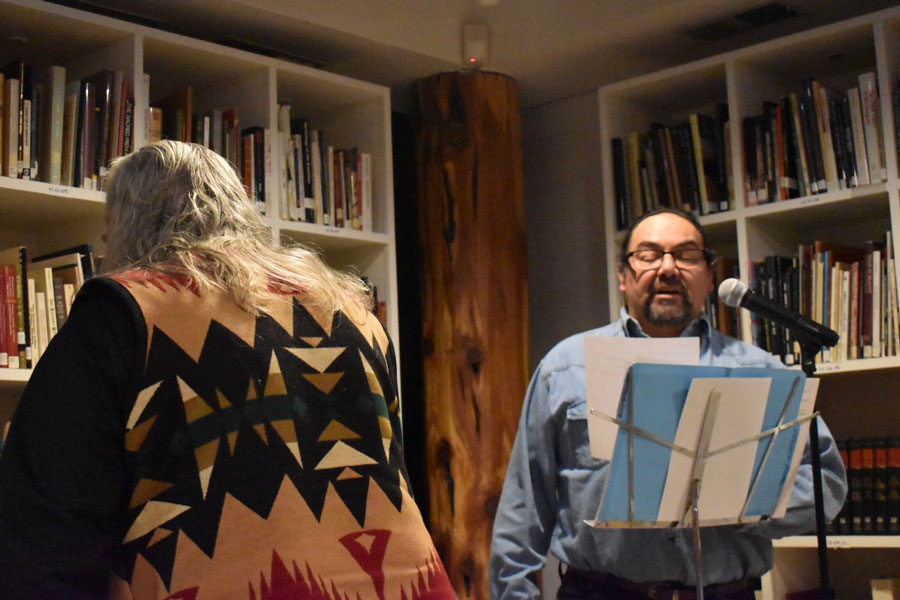Poets examine dual cultures in Mitchell Museum storytelling event
Maia Spoto/The Daily Northwestern
Vincent Romero reads poetry in “A Winter Night of Indigenous Tellings” at the Mitchell Museum of the American Indian. The storytelling event followed a series of Indigenous poetry workshops affiliated with the American Indian Center of Chicago.
January 31, 2020
Local poets, musicians and storytellers Thursday shared their experiences living in both Native and Chicagoan cultures in “A Winter Night of Indigenous Tellings.”
The event followed a series of Indigenous poetry workshops led both online and in person by Dave Spencer (Mississippi Chata/Diné) and Vincent Romero (Laguna Pueblo) at the American Indian Center of Chicago.
Spencer and Romero partnered with Kathleen McDonald, executive director of Mitchell Museum of the American Indian, to hold the performance in the Mitchell Museum’s library. The museum focuses on North American Native people’s art, history, culture and current events.
At the reading, participants with varying levels of poetic experience engaged with the legacy of established local Native American poets, such as the late E. Donald Two Rivers (Ojibwa), as they exercised their own voices. Audience members also shared poetry in an open mic session at the event’s conclusion.
“We have a number of talented, wonderful, fantastic storytellers in the Chicago Native American community,” said Romero, the event’s emcee. “Tonight, you’re going to hear from just a few.”
He said Native American culture sees winter and its “frigidity” as a time to celebrate indoor traditions like oral storytelling.
A self-described daydreamer and a storyteller since early childhood, Romero performed poems that bantered about aging, examined spirituality and contemplated nature.
He also shared a piece about the legend of La Llorona, which he wove into a conversation on the importance of examining historical context in modern storytelling. Romero said when European conquerors arrived, they distorted traditional narratives.
“The heroes of that particular culture… suddenly became evil,” he said. “Someone who will take your soul. When we talk about (the heroes and the villains), please keep in mind, to the people of that culture, it might be something totally different, historically and culturally.”
As he lead the poetry workshop, Romero said he saw participants who hadn’t written anything before find their creative voices.
One such poet, Ben Krause-Decorah (Ho-Chunk), said he struggled initially with writing fictitious narratives, but he loved telling stories. He said the workshop allowed him to marry his mother’s Native American roots and his father’s experience with poetry.
“Ho-Chunks, traditionally, have always been able to tell stories,” Krause-Decorah said. “It’s been a really important part of who we are as people.”
Krause-Decorah shared two pieces. One highlighted his war veteran relative’s marriage to a member of the U.S. Air Force overseas, and the other described a storm sewer’s love affair with a rain gutter.
Bill Buchholtz (Algonkin and French Canadian), a friend of Romero’s, accompanied a few of the performances with his flute music, shifting keys and rhythms to complement the different moods each piece evoked.
Buchholtz has been playing Native flutes for over 20 years. He said he loves “jamming” and uses his music to facilitate unity in a divided world.
“It’s my way of giving back to not just my community, but all communities,” Buchholtz said. “We need to understand each other. If we don’t talk to each other and do things with each other, how’s that going to happen?”
Email: [email protected]
Twitter: @maia_spoto


